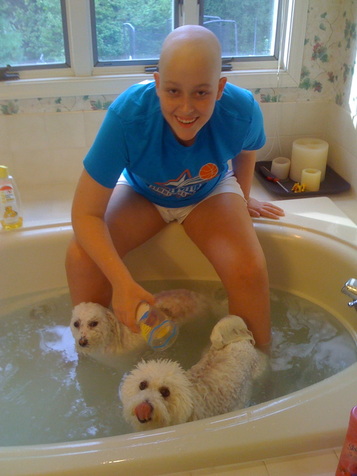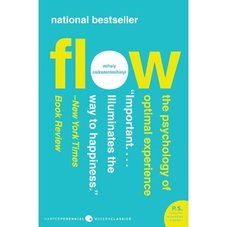| I have recently realized that, as a Duke Student, I am seriously lacking in intellectual reading experience. So, while at the mall with some friends last weekend, I took a trip to Barnes and Noble on a search for some thought-provoking, useful reading. I was definitely NOT going to wander through any of the political science or current events aisles. As much as I like history and am a proponent of keeping up with the times, I’m all about staying positive and I don’t find current events/politics so useful for that! Instead, as I wandered around, I surprisingly found a “Psychology” section, which I excitedly browsed. Initially I just saw a bunch of semi-ridiculous self-help books that did not seem all that helpful, and there were certainly enough books on serious mental illness. As I started to lose hope, thinking I would just not find that perfect intellectual read on the art of staying positive, I FOUND IT. Flow. One word and incredibly powerful. “The psychology of optimal experience”; five words that I really like. Mihaly Csikszentmihalyi, the author of Flow, had written exactly what I was looking for. I bought the book right away, and began reading it the next day. My favorite quote from the first chapter is this: "What I discovered was that happiness is not something that happens. It is not the result of good fortune or random chance. It is not something money can buy or power command. It does not depend on outside events, but, rather, how we interpret them. Happiness, in fact, is a condition that must be prepared for, cultivated, and defended privately by each person. People who learn to control inner experience will be able to determine the quality of their lives, which is as close as any of us can come to being happy.” I don’t totally agree with everything he says, because I think it is hard to really control one’s inner experience. But, I do believe he hits the nail on the head in saying happiness depends on how we interpret what happens to us and how we prepare for it, cultivate it, and defend it. Csikszentmihlyi writes that being able to do all of that enables you to have what he calls “optimal experience.” Let’s be real though….how much “optimal experience” is going on in pediatric or adult oncology clinics? That was my question….until I thought about it, and realized…how do the little kids who go through something as awful as cancer treatment wander around the playroom smiling and playing as if nothing was “different?” Their childhood was happy, then something came and threatened it. But, as kids, they naturally prepare to be happy and cultivate happiness. So, when their happiness was at risk, they defended it by playing, just playing and finding the toys in the midst of IV poles, baldness, and masks. I wonder if they have this whole thing figured out? I wonder if we can prepare to be happy, to cultivate happiness, and to defend our happiness when it is threatened, by doing what those little kids in the playroom do. Even if you aren’t looking to play with legos or American Girl dolls anytime soon, you could find a thought-provoking book like Flow or do something else that helps you cultivate and defend your happiness. You can check out one of my old blog posts, Finding Your Happy Place, for some similar suggestions. But, I have also found that simply learning to interpret the events that have happened to me, as Csikszentmihlyi suggested, makes it much easier for me to make all my experiences optimal experiences. I can look back at some of my own experiences and note some that are quite the opposite of optimal. There was the time that…
That being said, I distinctly remember something positive in the midst of or after each of those experiences, and I choose to interpret those experiences as just prequels to some of the most amazing moments of my life. Towards the end of my 28 day spinal headache, I found out I was in remission and officially cancer free. Shortly after homecoming in the fall of 10th grade, I returned to high school after having been absent for 2 years. The first time I wore a bathing suit, revealing what my treatment did to me, no one noticed or cared and I had the most amazing time at the pool with all of my friends. When I got those 40%’s on my Organic Chemistry tests, my friends just happened to have been struggling with something too and we all decided we’d do something fun together to get over the bummer of the bad grades. When I didn’t get into the NICU summer internship, I ended up back here at Duke doing a summer research practicum in the lab of one of my psychology professors, which has been an incredible learning experience and has helped me get a better idea of whether I prefer medicine or psychology for my future. When you think about your experiences, you can interpret them however you want. But, I encourage you to at least take some time to find out the best way to make your life experiences optimal experiences :-) Cancer, and any major challenge really, can seem like a barrier to what you are trying to achieve. However, such obstacles can also serve as motivators and reminders to live fully. It just depends on you. |
|
0 Comments
 When my purpose for the day was to give my dogs a bath! When my purpose for the day was to give my dogs a bath! I’m so glad to be back with another, long overdue post! Another amazing year of college just ended and I find myself back at home, completely lost and waiting patiently until I head back to Duke for a summer class, and then leave to go abroad for the fall semester. In these two weeks that I have as a real break, I think back to those two and a half long years I was really stuck here at home, sick with leukemia. Now, I sit here idle on the sofa watching Netflix because I choose to and because my brain is effectively turned off until classes resume. But, not too long ago, I sat here idle on the sofa watching Netflix because that was all I could do. The difference between the two is not blatantly obvious, no. It is rather a subtle difference actually, but a difference of significance nonetheless. Purpose is the difference. When going through treatment, it's really easy to lose a sense of purpose in your life. For me, I gain a great sense of purpose and motivation from what I see ahead of me: fun with friends on summer weekends when we aren't in our classes, spending my birthday (July 4) weekend back at home with my family, and studying in Holland this Fall while immersing myself in a different culture for four months. When you go through treatment, you lose a lot of those life-filled activities that get you excited to get up in the morning and just live. I know I found it was easy to lose that ability to "look forward to" the next big adventure. However, with leukemia, the next big adventure often for me was going in for a five-day inpatient chemo trip that ended with me being utterly miserable. So, I've been wondering, how can a cancer patient regain some sense of purpose? How do you get excited about living a life that no one wants to live through? While I don't know if there's a definitive answer to this question of mine, I have personally come to this conclusion: you have to temporarily refocus your purpose. Right before I was diagnosed, my purpose in life at that time was to do as well as I could in middle school and be a happy, healthy teen. I had a goal of being a doctor and that reinforced my sense of purpose even more, driving me to do my best in school and my extracurricular activities. But, after I was diagnosed, my days didn't seem to have purpose anymore. Towards the beginning of my treatment, this aimlessness was a real challenge for me. I was used to a schedule, the structured life of a student. I wasn’t used to waking up in the morning, not wanting to eat and laying in bed all day. It was an extremely hard transition. I wasn't too good at handling that transition at first, I got kind of frustrated by it all: missing school, missing friends, missing “normal.” However, with the support from my parents, nurse, and doctor, I refocused my purpose. I made it a challenge each week to guess my blood counts and learn more about cancer from my doctor. I tried to accomplish things once in a while, even though that was often simply painting or brushing my dogs. I wrote down a lot of what I was going through in a journal too, so that I could document it and remember it all in the future. I also tried to focus on studying and finishing my homework as much as I could, which helped me have a sense of purpose and have the greater goal of going to college after high school. Soon, I realized that I had refocused my purpose. My purpose then was to live through each day, which was often more than enough of a challenge. My purpose was to accomplish little things that reminded me I had a life to live. Whether I set out to get homework done, to watch a whole season of Friends, or to play with my dogs, I made sure I was consciously DOING something. Looking back on all of that, I think now that ensuring I went through each day with some sense of purpose made a big difference for me. I was able to feel somewhat capable and hopeful because of it, and I know that helped me to stay positive. So, I encourage you to set out to have a purpose each day, no matter what phase of treatment you are in. Whether that purpose is to watch five episodes of your favorite TV show, get up and walk to the bathroom on your own, paint a picture of your dog, take a walk with your family, or finish a school project….. it matters! It matters because what you accomplish each day, however small, can remind you that there is more to your life than pills, needles, and nights in the hospital. When treatment constantly reminds you of how dependent you are, these things can remind you how CAPABLE you are still. |
Archives
April 2021
Categories
All
SubscribeTo subscribe to my blog, click RSS Feed above. If you are using Google Chrome, click here and add the RSS subscription extension (by Google) in order to be able to subscribe to my blog!
|

 RSS Feed
RSS Feed

